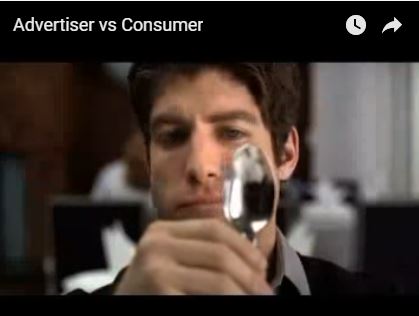
So true: relationships between the advertiser and the consumer
From BringTheLoveBack, found through the Muse blog.
Hm, I think this is also what the relationship between the customer and the agency is like sometimes.

From BringTheLoveBack, found through the Muse blog.
Hm, I think this is also what the relationship between the customer and the agency is like sometimes.
Here I was, standing at shore of the Huangpu river, quietly overlooking Shanghai, when this came floating by.
Now, there are a lot of screens already all over the city: huge LED billboards on buildings, LCD screens in taxi’s, plasma screen in subway stations, gyms and whatnot. You name it, they have a screen with advertising in or on it.
So when the whole city filled up, someone had the genius idea to throw a huge LED screen on a boat, put some ads on it and take it up and down the river. I guess this qualifies as “mobile” advertising. Or visual pollution if you happen to be in the mood to stroll by the water and take in the city views. Nothing is sacred any more.
Well, I’m not exactly passing through China, but rather visiting Shanghai for the Intel Developer forum. It’s an interesting city, and with a population of 18 million people there are actually more people living there than in my own country. Go figure. Actually, that could be a scary thought… or a comforting one, if you take into account the saying that “No matter how great your triumphs or how tragic your defeats, 1.3 billion Chinese couldn’t care less.” To be honest, it might be up to 1.4 by now as the 1.3 figure was almost a year ago. Oh, and did I mention that they likely have the largest online population too now. Well, almost.
On board of my KLM flight was also a Dutch delegation on a one-week china trip. Follow their journey on marketingfacts.nl (Dutch only).
On a side-note, It was a bit of an adjustment to see all those people smoking everywhere again, as we’ve had so many bans on smoking in Europe, that it’s hard to imagine that many smokers all over the place again. I was also surprised that I didn’t see that many fancy new cars all over the place… mabe I was just in the wrong district.
I used to be a big believer in wikipedia and looked up references and information on it for, well, just about anything. Up until now, when I experienced firsthand how factual information can be removed and you’re left in the cold when you’ry to do anything about it.
Here is what happened: I’m a member of an official federation (International Krav Maga Federation in Belgium if you must know), so I added a link to the federation’s belgian site on the Krav Maga page on Wikipedia at the end of January. After all, we’re an official federation, so no harm (note: I didn’t remove any links to other federations, not even “competitive” ones. We all want to be known and it’s a free world.). One week later the link was removed (by someone from another KM club in The Netherlands, but that’s beside the point). I mail the owner of the page and the one who deleted it, and asked for explanation. None received. “OK, an error”, I think, and I place the link again (after mailing the helpdesk at wikipedia what to do). It gets deleted again, this time by another user, and I get what seems like an automated comment that I shouldn’t place links, and that if I do it again it will be considered “vandalism” (really!). That kind of puts me off ever wanting to contribute anything there again.
Actually, the exact post is:
“The external link(s) you placed in one or several articles, have been removed. Although we appreciate your contributions to Wikipedia, we strive to keep the number of external links at Wikipedia as low as possible. Wikipedia is first and foremost an encyclopedia, and not a collection of links to other websites. We prefer that you add any relevant encyclopedic information to the articles themselves. Thank you for your understanding. Adding the link again without any discussion in advance may be regarded as vandalism. You may provide links like these to various portals on the internet.
Let me take that reasoning apart.
Over at CrunchNotes they seem to have experienced the same:
“While wikipedia appears to be open to all, I’ve seen numerous examples of changes getting immediately deleted for what appears to be political reasons rather than the pursuit of pure knowledge. And I’ve also seen people be attacked for making changes that appear to be factual and correct. The TechCrunch listing on wikipedia has a number of errors. But there is no way in hell I’d ever think about fixing those errors. The wikipedia community has completely intimidated me to the point where making a change to that site is unthinkable. So I do think Wikipedia needs to be fixed.”
I couldn’t agree more with them. Sadly. The system is flawed. Well, maybe not the system, but it has not accounted for human nature.
More on the International Herald Tribune and The Register.
Ok, impressive. I didn’t think they had it in them anymore (I’ve been a Sony-Ericsson convert for a number of years now), but the Nokia Morph concept looks very interesting.
From the press release: “Morph is a concept that demonstrates how future mobile devices might be stretchable and flexible, allowing the user to transform their mobile device into radically different shapes. It demonstrates the ultimate functionality that nanotechnology might be capable of delivering: flexible materials, transparent electronics and self-cleaning surfaces.“
More here on nanotechnology and the future of mobile phones. Now to make it come true.
Recent Comments